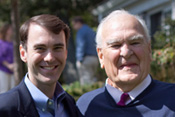The Latest with Lindsay: last updated 12/02/2011
 FOR IMMEDIATE RELEASE
FOR IMMEDIATE RELEASE
November 30, 2011
MEDIA CONTACT
Jo Kadlecek
978.867.4752
[email protected]
Wenham, MA—George Gallup, Jr., executive, public scholar and devoted Christian servant, passed away on Monday, November 21. Gordon College's President D. Michael Lindsay issued the following statement:
“Last week, the world lost a Christian leader of giant influence, and I lost a dear mentor and friend. Just 10 weeks ago, George Gallup, Jr. participated in Gordon’s inauguration festivities and then spent a sunny Saturday afternoon with my family at Wilson House. That day, we laughed and prayed and reminisced about memorable times we spent working together. Little did I realize that it was the last time I would see him in this life. In the intervening weeks, his battle with liver cancer took a turn for the worse, and he finally stepped into eternity last Monday, November 21 around 11 p.m.
On the very day that George passed away, I had spent a few hours planning a conference that I had hoped to host at Gordon to celebrate George Gallup’s legacy. His influence is vast. The social scientific study of religion, as we know it today, quite literally began around his breakfast table in the 1940s as he and his father brainstormed faith-related questions that eventually appeared on The Gallup Poll. When news magazines dubbed 1976 as ‘the year of the evangelical’ in the midst of Jimmy Carter’s bid for the White House, the national media turned to George for empirical data on religion. Because faith was a less-familiar subject for many of these journalists and editors, George provided on-the-fly tutorials for writers under deadline.
Eventually, he became a galvanizing figure for the Religion Newswriters Association and, more broadly, he championed the treatment of religion as a legitimate beat in national news outlets, which continues to this day. And anyone who has heard a recent sermon recognizes the widespread legitimacy a pastor has when he makes a point by saying ‘A Gallup Poll recently found . . .’
Born into a celebrated family and educated at Deerfield Academy and Princeton University, George Gallup was of patrician lineage within the American stratification system. In the 1970s, he was the face of American Express, appearing frequently in their series of commercials with the memorable tag line, ‘You may not know my face, but you know my name. And I carry the American Express card.’ But the celebrity dimension of George’s life is only a single aspect of the man I came to know, respect and love on many levels. Beyond George’s sway over leaders in the church, the media and the academy, he was the archetype of what I have in mind when I speak of ‘faithful leadership for the common good.’
When I worked for George, my desk was located right outside his office, and we frequently traveled together. Such proximity afforded me multiple opportunities to see how George wore his fame and status. He handled both in a way I would expect Jesus would in the same situations. When people asked to have their pictures taken with George, he would ask them to send him copies so that he would likewise have a memento to remember them by. When he met well-wishers after a lecture or in the airport, he customarily asked more questions of them than they had a chance to ask of him. He was genuinely interested in others, and even with complete strangers, he offered a love that defied explanation.
I was the beneficiary of that generous, loving spirit nearly 15 years ago when he agreed to take me on as a seminary intern, even though I knew nothing about polling or statistics. There is no doubt that my life would have taken a different trajectory if we had never worked together. George introduced me to the world of publishing and then connected me with Professor Robert Wuthnow, who ended up serving as my graduate school advisor.
I am eternally grateful that George was available to the Lord’s leading on that March afternoon when I first called his office in 1998. In a private moment at my inauguration, I asked him why he took an interest in me back then. ‘Because God brought us together,’ he responded. ‘And I try to be open to his leading when that happens.’ Many times since the inauguration, I have thought about that as I have sought to carry forth his legacy by making myself similarly available.”